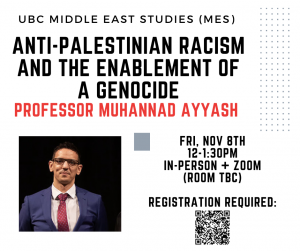NFJP Statement for the New Academic Semester
January 20, 2025
As we enter 2025, we are full of grief and rage at the US-funded ongoing Israeli genocide of Palestinians in the Gaza Strip. After more than 470 days of harrowing brutality that has targeted hospitals, schools, universities, and tens, if not hundreds of thousands, of Palestinians, the incoming Trump administration secured a ceasefire from the intransigent Netanyahu administration. Credible reports indicate that this ceasefire, which began on Sunday January 19, is contingent on a set of promises to the Israeli prime minister that include, above all, the annexation of the West Bank. The scope and breadth of the dispossession to come may well surpass these expectations.
Faculty for Justice in Palestine chapters across North America will face many challenges in the days, weeks, and months to come. As we fight to keep our voices strong, and in solidarity with those of our student allies, we must follow the lead of Palestinian scholars in the Gaza Strip who have called on us to support their efforts to rebuild in the wake of scholasticide, a term Karma Nabulsi coined in 2009 to name Israel’s systematic destruction of Palestinian education.
Since October 2023, armed and abetted by the United States, Israeli forces have destroyed eighty percent of the schools and every single university in the Gaza Strip. These include: the Islamic University of Gaza, the University College of Applied Sciences, Al-Azhar University, Al-Aqsa University, Palestine Technical College, Al-Quds Open University, Gaza University and Al-Israa University. Since October 2023, armed and abetted by the United States, Israeli forces have also destroyed nearly every library, archive, and cultural center in the Gaza Strip. The Gaza Municipal Library, the Islamic Manuscript Library, and all municipal archives have been reduced to rubble: centuries of endowments, collections and documents are all gone.
As we wage our struggles in the ever-shrinking space available for speaking the truth about Palestine in the United States, here are some tools to center Palestine and Palestinian voices:
- Scholars Against the War in Palestine toolkit: https://scholarsagainstwar.org/toolkit/
- Librarians and Archivists with Palestine: https://librarianswithpalestine.org/gaza-report-2024/; especially their One Book, Many Communities events: https://librarianswithpalestine.org/campaigns-2/onebookcampaign/;
- Institute for Palestine Studies articles and reports such as this one by Abdel Latif Zaki Abu Hashem: https://www.palestine-studies.org/ar/node/1655344;
- the Right to Education Campaign at Birzeit University: https://right2edu.birzeit.edu/
FJP chapters across the United States now confront the torrent of repression and punishment of academic speech that the Trump administration has promised, likely intensifying the repression of the Biden administration. As we move into 2025, National FJP will work in coalition with other organizations committed to defending academic speech, including the Middle East Studies Association of North America, Palestine Legal, the Coalition to End Zionist Repression, AAUP and AAUP/AFT 6741, and the Center for Academic Freedom, among others. We know that standing up against scholasticide in Palestine is also an act of standing up for our own universities, where corporatization, securitization, and austerity politics are rapidly eroding higher education, academic freedom, and other basic rights. We know that taking ethical positions against genocide, no matter what our opponents call us, is the only way forward. We applaud the brave people who have made these positions possible through the work of local FJP chapters and at various academic associations and institutions.
And we listen to Palestinian scholars in the Gaza Strip who remind us: “We built these universities from tents. And from tents, with the support of our friends, we will rebuild them once again.”
Steering Committee, Faculty for Justice in Palestine, National Network


 ‘
‘

 I was delighted to have the opportunity to lead a research seminar with the
I was delighted to have the opportunity to lead a research seminar with the 